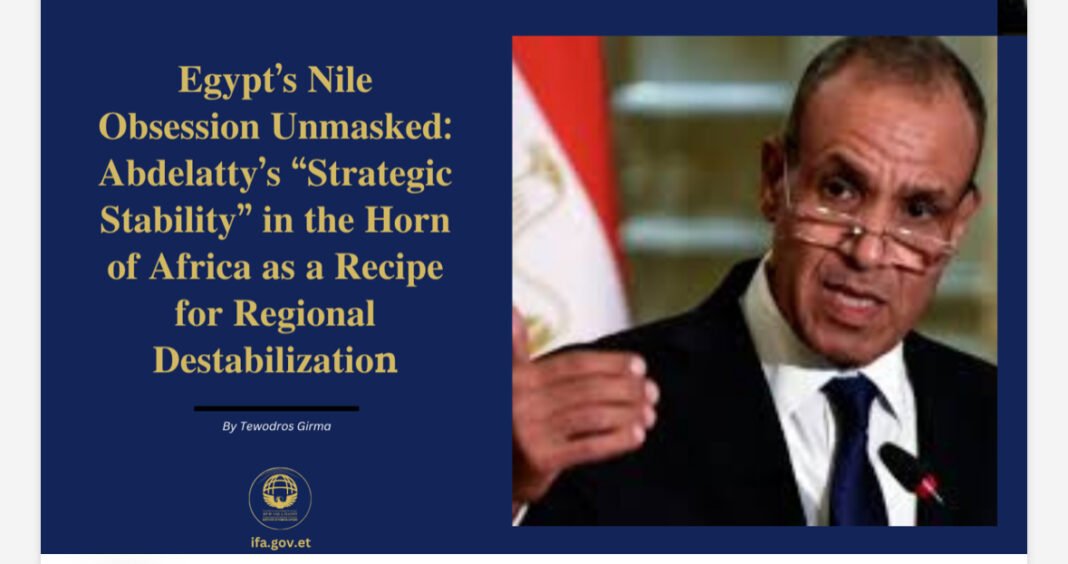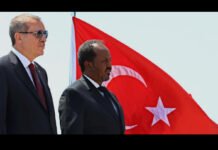Egyptian Foreign Minister Badr Abdelatty recently wrote an article that is published under the Opinion Column of News24.com. The minister stated that his country is “determined to deploy all tools to restore balance and stability in the Horn of Africa.” Anyone familiar with Egypt’s policy towards the region can easily detects the troubling schemes hidden behind his carefully crafted language that is Egypt’s continued attempt to destabilize the region to preserve its dominance over the Nile waters and its geopolitical influence in the region.
As an Ethiopian diplomat, I find it necessary to respond to this narrative to get the facts straight. I would like to tell the minister that the Horn of Africa deserves a real stability built on cooperation and respect, unlike what his country is envisioning, which is manipulation with a hidden agenda of keeping the entire horn in a perpetual cycle of crisis. We all know that Egypt, has never been and will never be a guarantor of stability in the Horn.
In fact, this is a typical Egyptian approach of posturing itself as a formidable power in the region. For years, Egypt has presented itself as a champion of peace while engaging in actions that undermine the very stability it claims to defend. Its deep involvement in the ongoing conflict in the Sudan speaks loud and clears of the true intention of Egypt when it comes to issues of peace and security in the broader Nile basin and the horn of Africa more specifically.
In Sudan, instead of supporting balanced, African led peace initiatives, Egypt has opted fuelling the crises both covert and overtly, prolonging human suffering and threatening regional security. This approach reveals Cairo’s true concern, which is not the wellbeing of the Sudanese people, but the preservation of a political order that serves its interest over the Nile. Egypt knows that a stable Sudan will expand its irrigation infrastructure, encouraged by the regulated flow of the Nile water, thanks to the GERD. Hence, the primary mission of Egypt is to make sure Sudan remained debilitated and divided, so as it will have no time and resource to develop its agricultural potential. This is Egypt’s long held strategy towards the entire upper riparian countries: keeping the entire basin weak, divided, and distracted, while Egypt continues to enjoy unquestioned rights over the shared river.
Equally alarming is Egypt’s growing interest in deploying troops to Somalia and expanding its military footprint in the Horn. Framed as “cooperation” or “security assistance,” these moves carry a different meaning when viewed in the context of Egypt’s malicious broader regional ambitions. This is not about supporting Somalia’s stability, rather it is about establishing a strategic foothold along the Red Sea and near Ethiopia’s borders, a move guided by its old doctrine of ‘scarring Ethiopia’. This indicates that politicians in Cairo are reading from the old book. Today’s Ethiopia is far beyond that. Egypt’s bravado is the manifestation of its frustration ignited by the completion of the Grand Ethiopian Renaissance Dam, ending the status quo of monopoly. What is concerning is, its sabre-rattling risk aggravating fragile regional dynamics and creating new tensions in an area that needs partnership, not a proxy rivalry.
In his article, Minister Abdelatty described as “destabilizing” the “declared intention of some to obtain a Red Sea coastal base, despite being landlocked.” This statement clearly refers to Ethiopia’s declared and legitimate aspiration to have a reliable access to the sea.
Let me be clear here: Ethiopia’s pursuit of sea access is neither a military adventurism nor an expansionist ambition. It is a legal, historical and economic necessity, grounded in international law, regional cooperation, and the principles of mutual benefit. Ethiopia, with over 120 million people, is the engine of the Horn of Africa’s economy. Its ability to trade and connect to global markets benefits the entire region. To label this effort as “destabilizing” reveals more about Egypt’s fears than Ethiopia’s intentions. Cairo’s unease stems from the prospect of a stronger, self-reliant Ethiopia, one that is economically integrated and no longer subject to the geopolitical constraints, what Egypt has long exploited to destabilize Ethiopia.
Abdelatty’s article is only the clarification of Egypt’s long held position underscoring the fact that the Horn of Africa stands at crossroads. Either it can succumb to the politics of division championed by Egypt, or it can embrace the promise of collective progress heeding to the genuine calls of Ethiopia. We have been consistently calling for dialogue, regional integration, and indigenous solutions to African challenges.
Egypt, meanwhile, continues to rely on outdated doctrines of control, portraying every independent move by Ethiopia as a security concern and consequently issuing threats one after another. This mindset is unaware of the reality on the ground. The Ethiopia we have today can defend its national interest anywhere at any time and the thunders in Egypt will not yield rain in Ethiopia. The two countries stand to gain through cooperation, not through coercion or intimidation.
If Cairo truly seeks “balance and stability,” it must abandon its long held misguided policy of dominance, monopoly, exploitation and sponsoring crises in the greater Nile basin and the Horn of Africa in particular. The region does not need external guardian who exploits instability to advance its own agendas. It needs partners who believe in cooperation, mutual respect, and shared prosperity.
Egypt’s rhetoric about “restoring balance” is, in truth, an attempt to preserve imbalance, a status quo where one country’s dominance comes at the expense of the rest. That era is over. Wake up Egypt. For us, we will always stand for peace, but we will also stand firm against attempts to undermine or misrepresent our legitimate national interest, GERD is a testament.
By Tewodros Girma, Ethiopian Ambassador to Canada
(Personal views expressed do not necessarily represent the official position of the Government of Ethiopia.)




